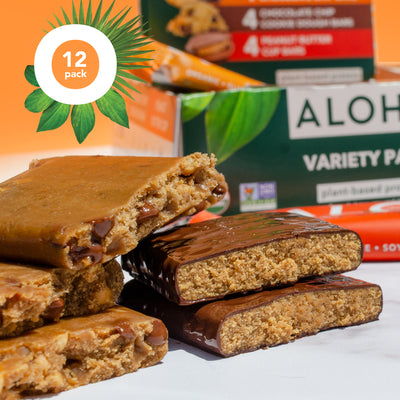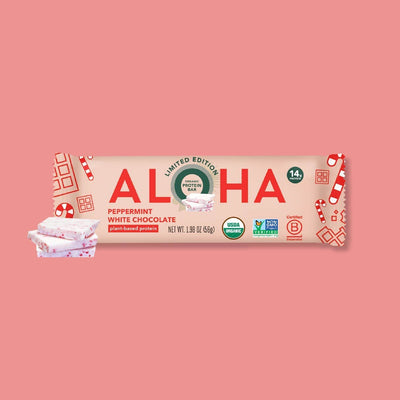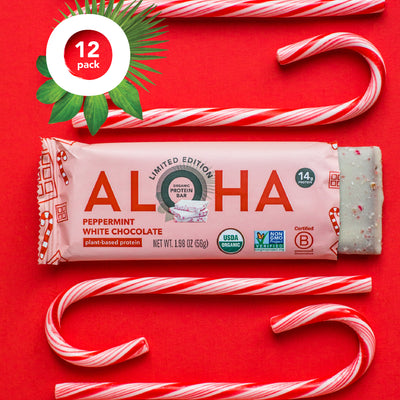Key Takeaways:
- Plenty Of Plant-Based Protein Options: Foods like beans, lentils, quinoa, and tofu are rich in protein and easy to include in a vegan diet. These sources provide essential nutrients to keep you energized and healthy.
- Protein Variety Ensures Balanced Nutrition: Eating a diverse range of plant-based proteins throughout the day helps you get all the necessary amino acids. Mixing foods like grains and legumes makes it easier to achieve a balanced diet.
- Easy Ways To Add Protein: Incorporating plant-based protein into meals is simple and versatile, from protein-packed smoothies to hearty salads. ALOHA’s protein drinks offer a convenient way to boost protein intake.
At ALOHA, we’re all about making nutrition simple and delicious. We’re proud to offer organic, plant-based protein drinks that taste great and provide the nutrients your body craves without artificial nonsense.
How do you meet your protein needs on a vegan diet? Many believe it's challenging, but that’s just a myth. Plant-based foods offer plenty of protein-packed options and are much more accessible than people realize.
This article will guide you through the best plant-based protein sources available. You'll also learn simple ways to add them to your vegan diet.
Understanding Protein Needs On A Vegan Diet
Meeting your daily protein requirements depends on factors like your age, activity level, and health goals. The recommended daily intake for most adults is about 50 to 60 grams of protein, but those who are highly active, such as athletes, may need more to support muscle repair and growth.
On a vegan diet, getting enough protein is easier than it sounds. You can easily meet your protein needs by including a variety of plant-based foods. The trick is to eat a mix of different foods to ensure you get all the essential amino acids necessary for optimal health and energy.
Top Plant-Based Protein Sources
Plant-based proteins are abundant and diverse, making it easy to get your daily intake from a vegan diet. Let’s explore some of the best options:
Legumes: Beans, Lentils, And Chickpeas
Legumes are an excellent source of plant-based protein and rich in fiber, making them great for digestion. Options like black beans, kidney beans, and chickpeas can be added to soups and salads or made into dips like hummus. Lentils are especially versatile, offering a substantial protein boost when used in stews, curries, or even salads.
Tofu, Tempeh, And Edamame
These soy-based foods provide complete protein, containing all nine essential amino acids. Tofu absorbs flavors well, making it perfect for stir-fries, while tempeh’s firmer texture works well grilled or baked. Steamed and lightly salted edamame is an easy snack or addition to salads packed with protein.
Quinoa: The Complete Protein Grain
Quinoa is a rare plant-based source containing all essential amino acids, making it a complete protein. It’s easy to cook and can be used in everything from breakfast bowls to hearty salads. Its nutty flavor and fluffy texture make it a great alternative to rice or pasta.
Nuts And Seeds
Nuts like almonds and cashews and seeds like chia, hemp, and flax provide protein, healthy fats, and fiber. A handful of almonds or a sprinkle of chia seeds in your smoothie or cereal can boost your protein. They are also easy to incorporate into snacks or toppings for various meals.
Plant-Based Protein Products
Plant-based protein products are convenient for a quick protein fix. ALOHA’s protein drinks, made from organic, non-GMO ingredients, offer 20 grams of protein per serving, perfect for after a workout or a quick breakfast on the go. Protein powders are also easily mixed into smoothies for an extra boost.
Vegetables High In Protein
Though vegetables aren’t often thought of as protein sources, veggies like spinach, broccoli, and Brussels sprouts contain significant amounts of protein. Adding these to your meals can help you boost your intake while providing a wealth of vitamins and minerals. Eating them regularly contributes to a well-rounded plant-based diet.
Grains And Cereals
Whole grains such as oats, barley, and farro are great sources of both fiber and protein. Pairing grains with legumes helps form a complete protein, ensuring you get all essential amino acids. These grains can be easily added to salads and soups or used as a base for various meals.
How To Incorporate These Protein Sources Into Your Daily Diet
Incorporating plant-based protein sources into your daily diet doesn’t have to be complicated. You can easily boost your protein intake throughout the day by making simple adjustments without sacrificing flavor or variety. Here’s how to do it:
Start Your Day With A Protein-Packed Smoothie
A smoothie is a perfect way to kickstart your morning and fuel your day with plant-based proteins. Blend ingredients like almond butter, spinach, chia seeds, and ALOHA plant-based protein powder for a quick, nutritious meal. This breakfast can keep you full and energized while providing a solid protein boost.
Build A Protein-Rich Salad For Lunch
Salads don’t have to be light on protein—add ingredients like quinoa, chickpeas, and edamame to make them hearty and nutritious. These plant-based sources provide a balanced intake of protein and other essential nutrients. A protein-rich salad is an excellent way to keep your energy up throughout the afternoon.
Combine Grains And Legumes For Dinner
For dinner, combining grains and legumes is an easy way to ensure you're getting a complete protein. Dishes like rice and beans or a lentil stew with farro are satisfying and packed with protein. These combinations give you the full spectrum of amino acids your body needs.
Snack On Nuts, Seeds, And Protein Drinks
Go for snacks like almonds, sunflower seeds, or a protein-rich drink when on the go. These snacks are convenient and provide a quick protein hit to tide you over between meals. They’re perfect for busy days when you need something healthy and filling.
How To Balance Your Amino Acids With Plant Proteins
While plant-based protein sources are rich in nutrients, most don’t contain all nine essential amino acids in one food. This is where combining different protein sources comes into play. Pairing grains and legumes with rice and beans creates a complete protein, giving your body all the amino acids it needs for muscle repair, energy, and overall health.
The good news is that you don’t need to eat these combinations at every meal. As long as you’re eating a variety of plant proteins throughout the day, your body can naturally balance the amino acids. This flexibility makes it easy to meet your protein needs without overthinking every meal.
Benefits Of A Vegan Diet
The benefits of a vegan diet extend beyond personal health, offering positive impacts on the environment and overall well-being. Let’s break down these benefits and explore how a plant-based lifestyle supports both your body and the planet:
Supports Heart Health
A well-balanced vegan diet is naturally low in cholesterol and saturated fats, helping to reduce the risk of heart disease. Its focus on fruits, vegetables, and whole grains provides essential nutrients that promote heart health. Over time, many people experience lower blood pressure and improved cholesterol levels.
Improves Digestion And Energy Levels
A vegan diet is rich in fiber from fruits, vegetables, and whole grains, supporting a healthy digestive system. Fiber helps maintain regular bowel movements and can prevent issues like constipation. Additionally, the nutrient-dense nature of plant-based foods often leads to sustained energy levels throughout the day.
Reduces Environmental Impact
A vegan diet can significantly reduce your carbon footprint, as plant-based foods typically require fewer natural resources to produce than animal products. By choosing vegan, you contribute to reducing greenhouse gas emissions, water use, and land degradation. It’s a powerful way to align your dietary choices with environmental sustainability.
Promotes Weight Management
Plant-based diets are often lower in calories yet rich in essential nutrients, which can help maintain a healthy weight. The high fiber content helps you feel full longer, reducing the tendency to overeat. Over time, many people on a vegan diet find it easier to manage their weight without counting calories or restricting portions.
Boosts Skin Health
Many people report improved skin clarity after transitioning to a vegan diet due to the high intake of vitamins and antioxidants from fruits and vegetables. Antioxidants help reduce inflammation and promote skin health by fighting free radicals that can cause damage. Nutrient-rich foods like leafy greens, berries, and nuts can support hydration and skin elasticity.
Supports Ethical Living
One key reason people adopt a vegan lifestyle is to align with their ethical values, particularly concerning animal welfare. Veganism avoids the exploitation of animals for food, which can be important for individuals concerned with reducing animal suffering. Choosing a vegan diet contributes to a more humane and compassionate world.
Final Thoughts
Embracing a plant-based diet doesn’t mean compromising on protein or variety. With so many nutrient-dense, plant-based options, getting adequate protein on a vegan diet is easier than ever. From versatile staples like legumes and grains to innovative products like ALOHA’s plant-based protein drinks, you have countless ways to fuel your body while supporting a cruelty-free lifestyle. The idea that plant-based diets lack sufficient protein is outdated, as a well-balanced approach can provide all the nutrients you need for strength, energy, and overall health.
Choosing plant-based proteins benefits your well-being and aligns with broader environmental and ethical values. A vegan diet is a powerful step toward sustainability, reducing the strain on natural resources while promoting compassionate living. Whether you are a long-time vegan or just beginning your plant-based journey, incorporating various protein-rich foods can nourish your body and the planet.
Read also:
- Vegan vs. Vegetarian: What's The Difference?
- How Much Protein Should You Eat To Build Muscle?
- Whey Protein vs. Plant Protein: Which Is Better?
Frequently Asked Questions About How To Get Protein On A Vegan Diet
What are some top plant-based sources of protein?
Legumes, soy-based products like tofu and tempeh, quinoa, nuts, seeds, and vegetables like spinach and broccoli are excellent plant-based protein sources. These options are easy to incorporate into a balanced vegan diet.
Can you get enough protein on a vegan diet?
Yes, it's possible to meet your protein needs on a vegan diet. A well-planned vegan diet with various plant-based foods can provide all the essential amino acids your body needs.
How can I increase my protein intake on a vegan diet?
You can increase your protein intake by adding more high-protein foods like beans, lentils, quinoa, and nuts. Using plant-based protein powders or drinks, like those from ALOHA, can also be a convenient way to boost your daily intake.
Is quinoa a good source of protein for vegans?
Yes, quinoa is an excellent source of plant-based protein. It is considered a complete protein, containing all nine essential amino acids, making it a valuable addition to a vegan diet.
How can vegans ensure they're getting all essential amino acids?
Vegans can ensure they get all essential amino acids by eating a variety of plant-based proteins throughout the day. Combining foods like grains and legumes, such as rice and beans, helps form a complete protein.
Can plant-based protein help with muscle building?
Yes, plant-based protein can support muscle building. Including high-protein sources like lentils, tofu, and quinoa, along with protein-rich products like ALOHA’s protein drinks, can provide the nutrients needed for muscle repair and growth.
What vegan foods are high in protein and easy to prepare?
Foods like lentils, chickpeas, tofu, and quinoa are protein-rich and easy to prepare. They can be used in soups, salads, and stir-fries for quick, protein-rich meals.
How can I add more protein to my vegan breakfast?
You can add more protein to your breakfast by blending protein powder into smoothies, adding chia seeds to oatmeal, or using almond butter in your recipes. ALOHA’s plant-based protein drinks are also convenient for a quick protein boost.
Are vegetables a good source of protein on a vegan diet?
Yes, some vegetables, such as spinach, broccoli, and Brussels sprouts, are surprisingly high in protein. While they may not have as much protein as legumes or tofu, they still contribute to your overall intake.
Can I use plant-based protein supplements on a vegan diet?
Yes, plant-based protein supplements are a great way to enhance your protein intake, especially for those with busy lifestyles. ALOHA’s protein drinks are convenient and tasty for boosting your daily protein.
Sources:
1. Koutentakis, M., Surma, S., Rogula, S., Filipiak, K. J., & Gąsecka, A. (2023). The Effect of a Vegan Diet on the Cardiovascular System. Journal of Cardiovascular Development and Disease, 10(3), 94. https://doi.org/10.3390/jcdd10030094
2. Łuszczki, E., Boakye, F., Zielińska, M., Dereń, K., Bartosiewicz, A., Oleksy, Ł., & Stolarczyk, A. (2023). Vegan diet: nutritional components, implementation, and effects on adults’ health. Frontiers in Nutrition, 10. https://doi.org/10.3389/fnut.2023.1294497
3. Craig, W. J. (2009). Health effects of vegan diets. The American Journal of Clinical Nutrition, 89(5), 1627S1633S.
4. Flores-Balderas, X., Peña-Peña, M., Rada, K. M., Alvarez-Alvarez, Y. Q., Guzmán-Martín, C. A., Sánchez-Gloria, J. L., Huang, F., Ruiz-Ojeda, D., Morán-Ramos, S., Springall, R., & Sánchez-Muñoz, F. (2023). Beneficial Effects of Plant-Based Diets on Skin Health and Inflammatory Skin Diseases. Nutrients, 15(13), 2842. https://doi.org/10.3390/nu15132842
5. Fam, V. W., Charoenwoodhipong, P., Sivamani, R. K., Holt, R. R., Keen, C. L., & Hackman, R. M. (2021). Plant-Based Foods for Skin Health: A Narrative Review. Journal of the Academy of Nutrition and Dietetics, 122(3). https://doi.org/10.1016/j.jand.2021.10.024
6. Ayaz, A., Zaman, W., Radák, Z., & Gu, Y. (2024). Green strength: The role of micronutrients in plant-based diets for athletic performance enhancement. Heliyon, 10(12), e32803. https://doi.org/10.1016/j.heliyon.2024.e32803
ALOHA's products are not intended to treat, diagnose, mitigate, prevent, or cure disease. ALOHA's products should not replace prescribed medications or the variety of foods important to a healthful diet.
Do not self-diagnose any health condition. Work with your healthcare provider to determine how best to achieve optimal health.











